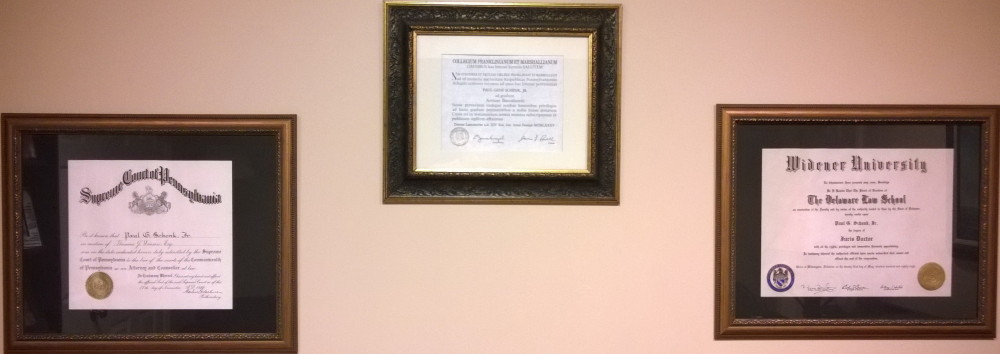THE FOLLOWING STUDY ARTICLE POSTING IS INTENDED TO SUPPORT AWARENESS AND UNDERSTANDING. IT IS ONLY A PRELIMINARY LEVEL LEGAL STUDY ARTICLE AND IT IS NOT LEGAL ADVICE. IF THE READER SEEKS LEGAL ADVICE CONCERNING HIS OR HER PARTICULAR SITUATION, HE OR SHE SHOULD SEEK OUT AN ATTORNEY IN A LAWYER CLIENT RELATIONSHIP.
“Undue Influence” Can Exist When A Person In A Confidential Relationship With A Grantor Or Testator Of Weakened Intellect Receives A Substantial Portion Of The Grantor’s Property.
Presumption of Undue Influence
There is a presumption of undue influence when clear and convincing evidence demonstrates a prima facie case that a person in a confidential relationship with a grantor or testator of weakened intellect receives a substantial portion of the grantor’s property . In re: Paul’s Estate, 180 A.2d 254 (Pa. 1962). Once a presumption of undue influence arises, the burden of proof shifts and undue influence must be disproved by clear and convincing evidence. Owens v. Mazzei, 847 A. 2d 700 (Pa. Super. 2004) .
Confidential Relationship
A “confidential relationship” arises when the circumstances make it certain that parties did not deal on equal terms, but rather there is an overmastering influence on one side and on the other weakness, dependence or trust, justifiably reposed. Owens v. Mazzei, 847 A. 2d 700 (Pa. Super. 2004); In re: Estate of Angle, 777 A.2d 114 (Pa. Super 2001) .
So long as the requisite disparity is established between the parties’ positions in the relationship, and the inferior party places primary trust in the other’s counsel, a confidential relationship may be established.” Basile v. H & R Block, Inc., 777 A.2d 95, 101 (Pa. Super. 2001) .
Such a relationship exists whenever one occupies toward another such a position of advisor or counselor as reasonably to inspire confidence that he will act in good faith for the other’s interest ” Estate of Keiper, 308 Pa. Super. 82, 454 A.2d 31, 33 (1981).
For example, where a principal grants a power of attorney to another, it is a clear indication of a confidential relationship. Foster v. Schmitt, 429 Pa. 102, 239 A.2d 471, 474 (1968).
Weakened Intellect
The “weakened intellect” which must be shown in order to establish a prima facie case of undue influence need not amount to testamentary incapacity or rise to the level of the lack of capacity . In re Clark’s Estate, [334 A.2d 628 (Pa. 1975)]; Estate of Glover, 447 Pa. Super. 509 (1996). “Testamentary capacity” exists where a testator has intelligent knowledge of the objects of his/her bounty, the general composition of his/her estate, and what he/she wants done with it. Estate of Reichel, 400 A.2d 1268 (Pa. Super. 1979). Thus, although one may have an intelligent knowledge of the objects of his or her bounty , the general composition of his/her estate , as well as what he/she wants done with it, he/she may still yet have a “ weakened intellect” .
A “weakened intellect” is often accompanied by disorientation, confusion, and forgetfulness. Owens v. Mazzei, 847 A. 2d 700 (Pa. Super. 2004) Confusion, depression and anxiety, a steady decline in health, and issues with withdrawal, disinterestedness and increased memory deficits are all symptoms indicative of a weakened intellect. In re: Estate of Dorothy A. Carratura, No. 2113 of 2010, Memorandum Opinion and Order dated October 16, 2015.
“The closest that we can come, therefore, to a definition of weakened intellect is that it is a mind which, in all the circumstances of a particular situation, is inferior to normal minds in reasoning power, factual knowledge, freedom or thought and decision, and other characteristics of a fully competent mentality. It should be viewed essentially as a relative state as the term is applied to cases of undue influence, as these always involve the effect of one intellect upon another; if the intellect of the testator is substantially impaired in comparison to that of the proponent or beneficiary it must be regarded as weakened since there could be no equal dealings between the two parties.” Paolini Will, 13 Fiduc. Rep. 2d 185 (O.C. Montg. 1993) .
Undue Influence Conduct
Undue influence does not refer to all conduct capable of disposing in one’s favor a self-directing mind but to a control acquired over another which destroys his free agency. Thompson Will, 387 Pa. 82, 126 A.2d 740 (1956). Conduct constituting influence must consist of imprisonment of the body or mind, or fraud, or threats, or misrepresentations, or circumvention, or inordinate flattery, or physical or moral coercion, to such a degree as to prejudice the mind of the testator, to destroy his free agency and to operate as a present restraint upon him in the making of a will.” In Re: Estate Of : Gladys M. Reed , Deceased Appeal Of: Janet Reed – J. S58010/17 Decided: November 21, 2017.
